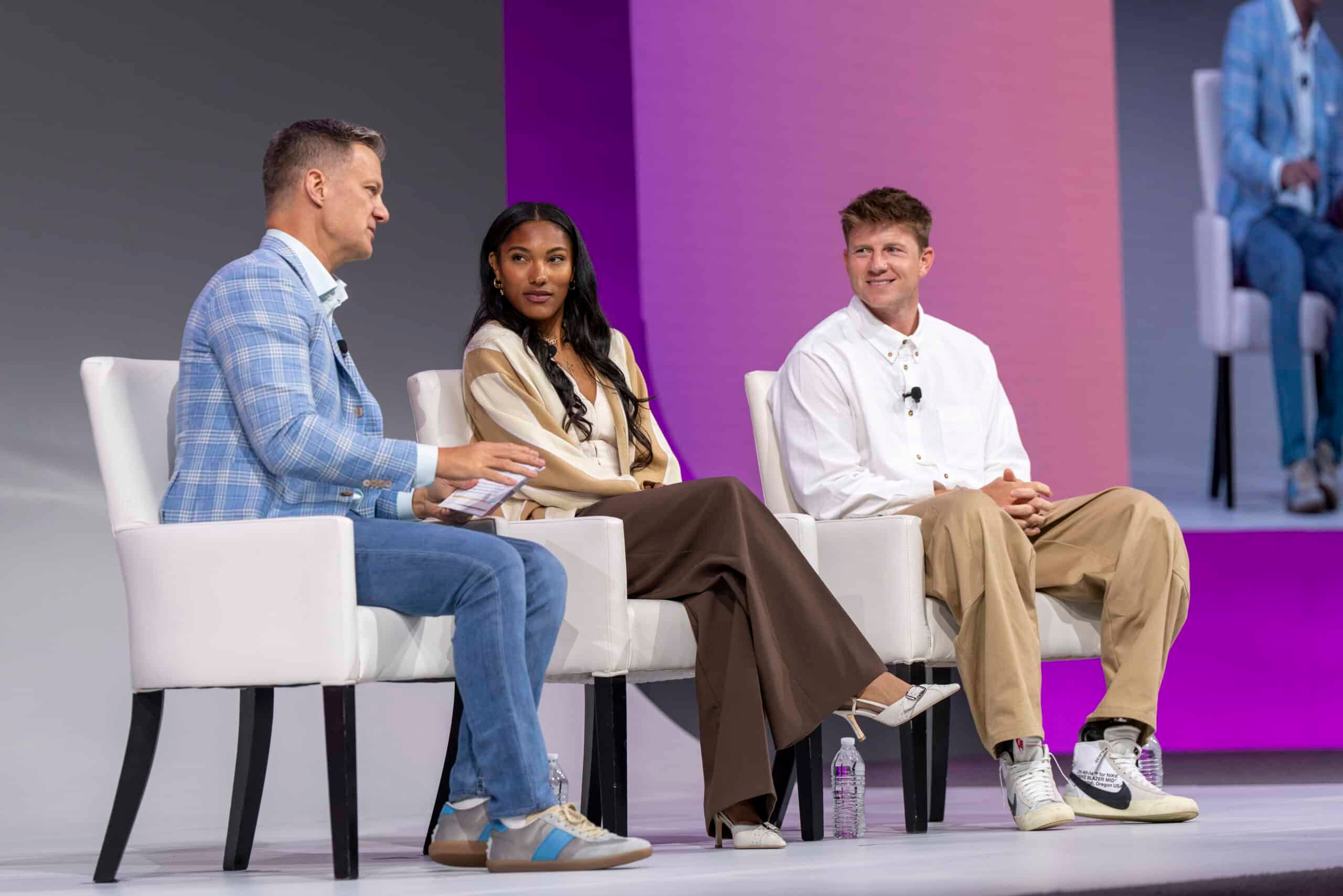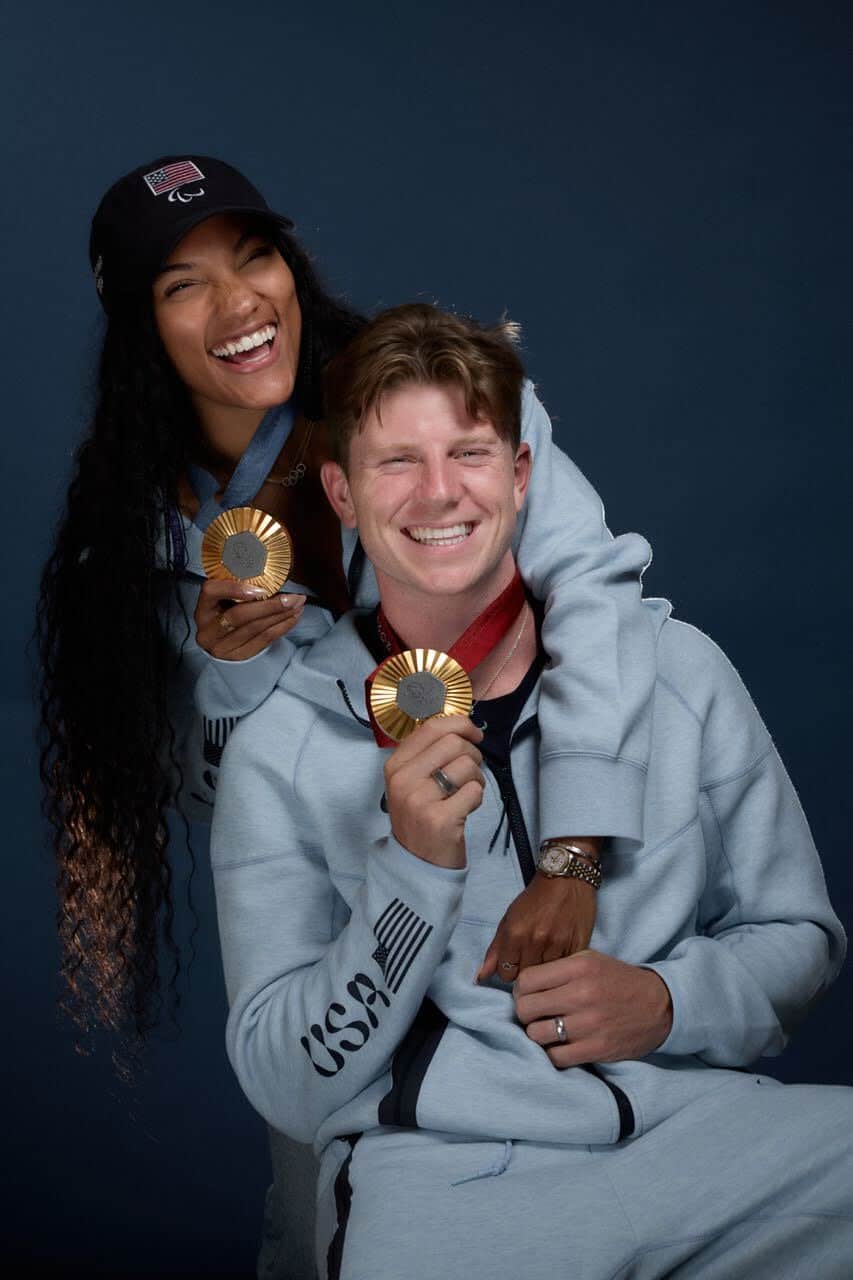The Boomi World events are much more than technology user conferences. They’re celebrations of what digital alchemists can achieve using Boomi to help customers create outcomes that shatter limits. The Boomi World 2025 keynote speakers in Dallas exemplified that attitude of overcoming barriers.
Track and field power couple Tara Davis-Woodhall and Hunter Woodhall are a team in every sense of the word. They train and travel the globe for competitions together. They’re business partners. And they also win gold medals together.
The Woodhalls were breakout stars at the 2024 Paris Olympics and Paralympics. Tara won the women’s Olympic long jump and fulfilled a goal she first set for herself at age four. Then her joyful leap into Hunter’s arms became the viral moment of the Games. A few weeks later, Hunter struck gold in the 400-meter T62 Paralympics competition.
“We both sat down in our living room and committed ourselves to making the Olympic and Paralympic teams,” Tara said. “Every day, we worked together to be the biggest accountability partner to each other. He’s worked harder than ever. I’ve worked harder than ever. When we combine those things together, we get gold.”
Their journey to the podium is a testament to perseverance and breaking boundaries. Hunter, who competes on carbon fiber “blades,” had both legs amputated below the knee at 11 months because of a congenital birth defect called fibular hemimelia. Tara is candid about coping with mental health challenges.
Success on the track is only part of the story for these Nike-sponsored athletes who met at an Idaho track meet in 2017 and married five years later. They’re entrepreneurs who have become social media sensations with about nine million followers across all platforms. In college, Hunter and two classmates also co-founded the online clothing company Giant Hoodies with $900, which he said has grown into “eight figures in revenue.”
Boomi Chairman and CEO Steve Lucas interviewed them on the Boomi World stage, and then they took some additional time afterward to speak. Here are portions of those conversations, which have been lightly edited for length and clarity.

Were you surprised at the reaction to your celebration after Tara’s victory in Paris?
Hunter Woodhall: We had no idea there were cameras on us. NBC said, “We have a ticket in the first row if you let us put a mic on you.” I was like, “Deal!” Then the stadium people said they weren’t allowed to have a camera there. I thought I was in the clear. But little did I know, there were cameras on the far side of the stadium recording it all.
Tara Davis-Woodhall: It was a moment that has happened so many times at a track meet for us. At the Olympic trials, I did the same, exact thing. But when we went home after the Olympics and I was scrolling social media, I was like, “Oh my gosh, Hunter. It’s blowing up! What is happening?” But it really captured our feelings. We know how we’ve worked to even get to that moment for my jump and then for his race. Now, being able to relive that is inspiring. It’s something that we get to show our kids for the rest of our lives.
You both have overcome so much just to get those opportunities.
Hunter Woodhall: A big part of my life story is Shriners Hospital for Children. There were so many doctors and specialists that my parents went to for answers, who literally told them, “I’m sorry, but your son will never be able to walk.” Well, doctors told me I would never walk, so I learned to run instead. That’s because a key group of people took a chance on me, believed in me, and saw something more than a kid with a disability. That was the folks at Shriners Hospital for Children. They’re the ones who gave my parents the idea to do an amputation, even though there wasn’t a lot of promise in the idea. Later, as I got into sports with my brothers, and I started doing 5ks, it was difficult running in these normal walking prosthetics. But I loved this idea of running, and the folks at Shriners said, “Let’s make you running blades.” There was no guarantee I was going to be a great athlete. They just saw a kid who wanted to live normally and said, “Let’s make it happen.”
Tara Davis-Woodhall: There was a time in my life when I was close to not waking up. I was so depressed and sad. It was a position where I didn’t think I was going to be able to wake up the next day. Probably our biggest enemy in dealing with mental health is when you don’t speak about what you’re feeling. It just absorbs your mind and takes over. The advice I give to anyone struggling in silence is to talk about it. Write it down in your journal. Just get it out of your head. Why do we have to sit here and beat ourselves up? We just have to be better at loving ourselves and allowing ourselves to make mistakes and to learn and grow and just be a human. It’s why now I truly believe that every day is a blessing. Every day is a new adventure.
What do you think business professionals can learn from your mindset as athletes?
Tara Davis-Woodhall: Everything takes time. It takes time to get good at what you’re doing. It takes time to be the best. Things just don’t happen overnight. It took time for me to get to this point. You’re not going to see me get a world record overnight. But when you take the time with hard work, it’s going to pay off eventually.
Hunter Woodhall: There are so many parallels between business and sport. There’s no difference between a big sales meeting, testing of a product, and a competition. It’s the pinnacle of your year, the thing that you’re preparing for. For athletes, it’s on full display, and everyone gets to see the result. But the same principles apply in business. When Tara and I got to the day of the competition, there wasn’t a voice in the back of our heads saying, “Oh, you didn’t do all the things needed.” We were fully confident. When we showed up at the Games, we kept telling each other, “We might not win, but we’re going to be really hard to beat.” In business, you’re doing the work beforehand, preparing, and then there’s a moment where you get to test how well your preparation was done. I think if business people were to learn anything from us, it’s that a good mindset for a good result comes from the correct preparation and discipline leading into it.
Is there something the rest of us can gain from you about perseverance?
Hunter Woodhall: After I had my legs amputated, I was just like any other kid. I learned how to walk by falling, getting back up, and trying again. Throughout my entire life, when I wake up, the first thing I have to do is put on my legs. No matter what goal I’m able to accomplish, no matter how big my presence is on social media or whatever, I still have to start the day the same way I always have, which is putting on my legs. It just reminds me to remember where you came from, remember who you’re doing this for, and remember what your purpose is.
Tara Davis-Woodhall: Track and field is an individual sport. So, I’m always asking myself, “What is my why? Why am I doing this? Why am I getting up every single day, going to the track when I don’t want to, or having a horrible workout?” And that’s because my younger self wanted to be the best athlete that I could be. But it took time to figure out how not to think of something as a negative thing if it didn’t turn out the way it was supposed to go. How can you make this into a positive? Hunter says you either win or you learn. So, once he said that, it’s kind of rewired my brain. If I did lose, how can I come back better? How can I come back to practice and overcome something that’s not letting me be the best?
Are there words you live by or favorite mantras?
Hunter Woodhall: We’re like a living book of mantras.
Tara Davis-Woodhall: One that helps ground us is, “These are the moments.” Hunter and I had a four-year distance relationship in college. We would pray, wish, and literally ask a genie to put us together. Now, we have all these cool moments that we’re doing together. So, remind ourselves, “These are the moments. These are the moments we wished and prayed for.” So just live in the moment.
Hunter Woodhall: Things go by so quickly, and we’ll be thinking about next week, or next month, or the thing that’s coming up. But we’ll say, “This, right now, is one of those moments that we’re going to remember forever.” But another thing we talk about is “our four walls.” It’s us, our dogs, our family, our very close friends, our team. We say that anything that happens outside of those four walls, you can’t worry about it. It’s not our problem.
Would your 17-year-old self have believed where you are now?
Tara Davis-Woodhall: Yes and no. I started track and field when I was four years old. I knew I wanted to go to the Olympics and win gold. My entire life has been dedicated to track and field. So, I would say yes, she would expect it, but probably not to the level of how much her life has changed.
Hunter Woodhall: So, this is my wife (pointing at Tara). My 17-year-old self would be pumped.
Up Close With Tara and Hunter

About Tara: Tara is a native of Texas and California, and attended the University of Georgia and the University of Texas. She finished sixth at the Tokyo Olympics in the long jump in 2021 and second in the 2023 World Championships before winning gold at the 2024 Games. She is also an assistant track coach at Kansas State.
About Hunter: Hunter was named the 2016 Male High School Track Athlete of the Year and is the first double-amputee track and field athlete to earn a Division I athletic scholarship. His accomplishments at the University of Arkansas included becoming a three-time All-American in the 4×400 meter relay. He won four previous Paralympic medals before earning gold in Paris.
What’s Next: Their sights are set on 2028 when the Olympics and Paralympics will be in Los Angeles.
Boomi World 2025 may be over, but we have Boomi World Tour stops coming up this fall with some other exciting special guests, including events in Tokyo, London, and Sydney.
